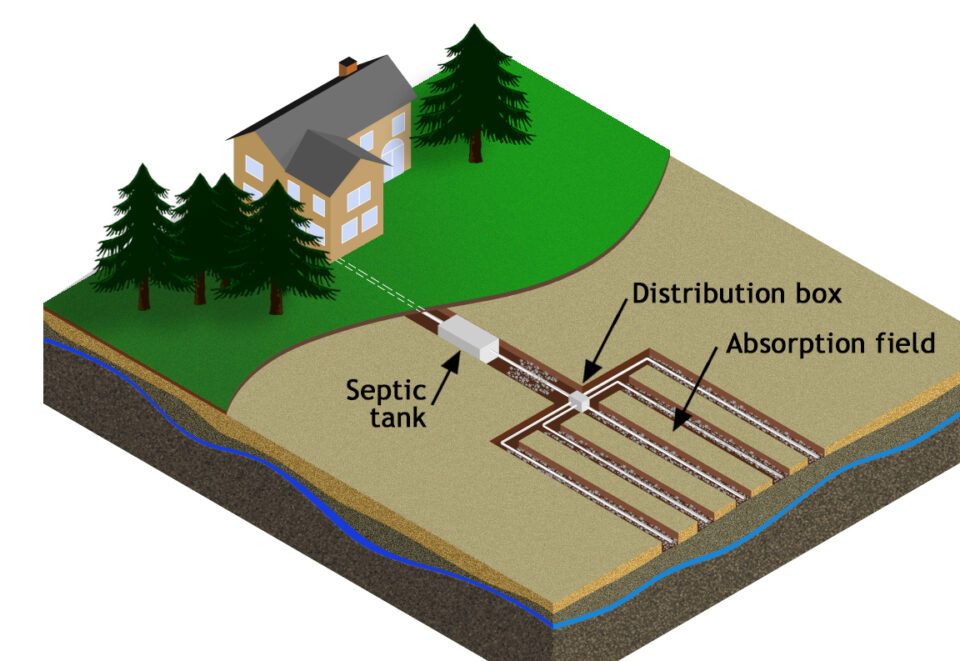Septic Systems
Septic systems, also known as on-site sewage systems, provide a safe alternative for disposing of household wastewater from showers, sinks, toilets and washing machines when municipal sewer service is unavailable.
A properly working septic system treats harmful bacteria found in wastewater and disperses it safely within the soil of your yard. A septic system that is not functioning properly can pose significant health risks to people, pets and the environment by discharging untreated sewage onto neighboring yards or nearby creeks or ditches.

Backyard seepage, toilets that won’t flush, bathtubs that won’t drain and illnesses from contaminated drinking water are a few of the problems related to these failures, not to mention the frustration of high repair or replacement costs.
The Department of Health’s Environmental Services Division Pollution Control Program issues permits and conducts inspections for all new on-site sewage disposal systems as well as repairs to existing systems in Allen County. Sites are also evaluated to determine suitability for installation of septic systems.
Note to Potential Land Buyers
Before purchasing land in an area without public sewer systems, the Department strongly recommends perspective buyers hire a soil scientist and septic designer to review the parcel and ensure a septic system can be installed. Factors like soil characteristics, topography and available space can determine whether a system will be feasible, since some sites in the community are not suitable for on-site wastewater treatment.

Signs of a Failing Septic System
Homeowners may mistakenly believe their septic systems are working, so long as the toilets flush properly and there is no smell in the yard or adjacent ditches. Septic systems can fail in other, less obvious ways, so it’s important to recognize the common signs of septic system failures.
Signs include:
- Slowly draining sinks and toilets
- Gurgling sounds in the plumbing
- Plumbing backups
- Sewage odors in the house or yard
- Ground is wet or mushy above your septic system’s absorption field
- Grass is greener or grows faster above your absorption field
- Tests show the presence of bacteria in nearby streams or well
Tips for Maintaining Your Septic System
To extend the life of your septic system, it’s important to practice the following maintenance steps:
- Have your septic tank pumped regularly.
Over time, sludge and scum can build up in a tank. Make sure to clean the tank, including the effluent filter, every three years.
- Monitor water usage.
Excess water use can overload the system. Install a water meter to monitor usage and do not do all the washing or laundry at one time.
- Be careful about what goes down the drain.
Avoid flushing any objects or substances that do not easily decompose. Do not use “septic tank additives” as they may do more harm than good.
- Protect the system.
Do not drive or park heavy equipment over the absorption field or plant trees or shrubs within it.
- Join the Allen County On-Site Wastewater Management District.
Benefits include regular inspections and preventative maintenance. For more information, call 260.449.4181 or email ACOWMD@allencounty.us
Call 260.449.7530 for more information or to report a concern with a septic system.
Certification Study Materials
- Residential On-Site Sewage Systems Rule 410 IAC 6-8.3 (A & B Test)
- Allen County Private Sewage Disposal Ordinance (A & B Test)
- Title 17 Article 1 Allen County On-Site Waste Water Management District Creation (C Test)
- Title 17 Article 2 Allen County On-Site Wastewater Management District Fees Ordinance (C Test)
- 327 IAC 15-14 OSS Discharging Disposal Systems within ACOWMD (C Test)
- Certified Evaluator Reference Manual (D Test)
From the Purdue Extension Office
The Purdue Extension Service has published a number of information sheets on septic system maintenance.